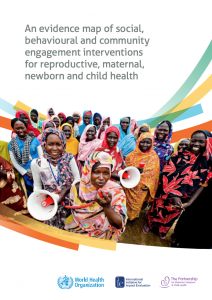
Women’s and children’s health has seen significant progress in recent decades, however, gains have been uneven and inequalities persist. The Every Woman Every Child (EWEC) Global Strategy for Women’s, Children’s, and Adolescent’s Health (2016-2030), (‘the EWEC Global Strategy’), released in parallel with the United Nations’ Sustainable Development Goals 2030 (SDGs) in September 2015, calls for action towards three objectives: Survive (end preventable deaths), Thrive (ensure health and wellbeing) and Transform (expand enabling environments). Achieving these objectives will depend on successfully scaling-up programmes that go beyond clinical and service delivery. Social, behavioural and community engagement (SBCE) interventions that address the capabilities of individuals, families and communities to contribute to improving their own health are fundamental to the realization of these objectives. Their role in programmes has possibly been neglected in the past due to a lack of evidence of their effectiveness. Decision-makers considering SBCE interventions need high-quality evidence on intervention effectiveness, particularly where, as is true of this domain, global guidance is limited although growing. A large number of research studies are produced every year but these are scattered across subjects, sources and locations. Research evidence needed to inform policies and programmes may be difficult to find and it is not clear which areas need further or new research. To address these issues, the World Health Organization (WHO) worked with the International Initiative for Impact Evaluation (3ie) to conduct an exercise to develop an evidence map of selected SBCE interventions related to reproductive, maternal, newborn and child health (RMNCH). The purpose was to identify existing and ongoing impact evaluations and systematic reviews of selected SBCE interventions to inform RMNCH programmes and identify evidence gaps where new impact evaluations, systematic reviews and WHO guidelines could add value. This report provides information on the methods used to develop the evidence map and summarizes the key findings. An interactive platform that visually presents the findings can be found at this link.